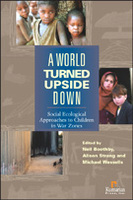A World Turned Upside Down: Social Ecological Approaches to Children in War Zones
Neil Boothby, Allison Strang, and Michael Wessells, editors | | ISBN: 978-1-56549-226-4 $72.00 |
| ISBN: 978-156549-225-7 $29.95 |
| 2006/260 pages/LC: 2006020202 A Kumarian Press Book |
DESCRIPTION
A World Turned Upside Down looks at children's experiences during war from a psychological and social ecological perspective, offering thoughtful observations and dispelling myths about the realities of growing up in conflict situations. In addition, each contributor points to ways to foster well-being and nurture the kinds of social connections that can liberate children from the pathologies of war.
ABOUT THE AUTHOR
Neil Boothby is Allan Rosenfeld Professor of Forced Migration and Health at Columbia University's Mailman School of Public Health. Allison Strang is senior research fellow at the Institute for International Health and Development, Queen Margaret University College. Michael Wessells is professor of clinical population and family health at the Mailman School of Public Health.
CONTENTS
- Introduction—the Editors.
- A Culture-based, Integrative Approach: Helping War-affected Children—K. Kostelny.
- What Is Family?: The Nature and Functions of Families in Times of Conflict—A. Ager.
- Running Scared: When Children Become Separated in Emergencies—A. Hepburn.
- Girlhoods Stolen: The Plight of Girl Soldiers During and After Armed Conflict—S. McKay.
- Education and Hope: A Psychosocial Assessment of Palestinian Children—C. Arafat and T. Musleh.
- Silenced Voices?: Yourth and Peer Relationships in Armed Conflict and Its Aftermath—S. McEvoy-Levy.
- When Former Child Soldiers Grow Up: The Keys to Reintergration and Reconciliation—N. Boothby.
- A Living Wage: The Importance of Livelihood in Reintergrating Former Child Solciers—M. Wessells.
- Religion as Resource and Risk: The Double-edged Sword for Children in Situations of Armed Conflict—M. Wessells and A. Strang.
- Layers of Support: The Social Ecology of Protecting Children in War—C. Triplehorn and C. Chen.


"The authors gather significant data and provide arresting analysis and insight. This book should be of interest to everyone who seeks to understand and reverse the terrible abuse of children in war zones."—George Rupp, International Rescue Committee
"An excellent reader for graduate students [and also] a valuable resource for development and humanitarian practitioners, policymakers, and organizations working in conflict, postconflict, and refugee settings."—Development in Practice
"An important addition to the study of war-affected children that can be a valuable resource for students, academics, policymakers. and practitioners who are interested in child and adolescent development and the need for an effective response to children traumatized by conflict."—Journal of Youth and Adolescence